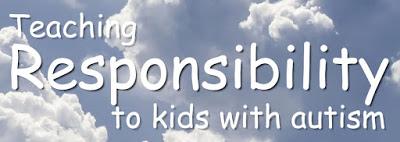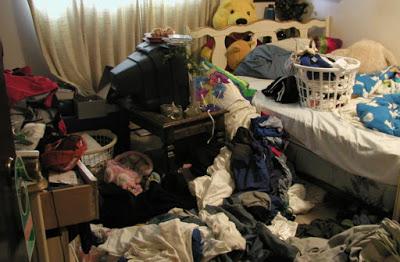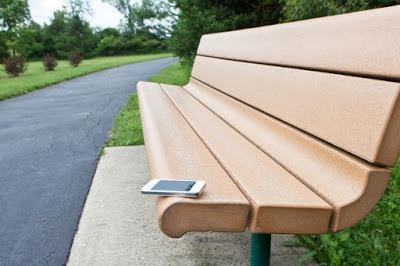
When you have kids at school, it's fairly common for them to go on overnight excursions and come home with many of the wrong items in their luggage or without phones, chargers backpacks etc.
This sort of behavior should be well and truly disappearing by about age 15 but some kids particularly those with autism, may carry it on much later in life. Sometimes into their twenties and beyond.
In this post, I want to look at some of the techniques for reducing this behavior.
The Three Categories
When travelling, kids generally fall into three broad categories;- The ones who never actually unpack their bags
These kids will live, sleep and sometimes even swim in the same clothes while on an excursion or camp. They're usually oblivious to the smell and will say that their mother forgot to pack items without ever having unzipped their bags to check. They rarely leave anything behind. - The ones who are excessively neat
These kids will fold everything sharply and put it back into their bags. On paper, they sound like the best kids in the world. Unfortunately, this excessive neatness can often be a warning sign of other neuroses. - The kids who throw their gear everywhere
These kids make a giant mess and it's little wonder that their clothes eventually end up missing under the bed, tangled up in blankets or in the luggage of other kids. They don't actually know or care about which clothes are theirs. When packing, they simply shove everything in sight back into their bags. These are the kids who always lose clothes and who always bring a whole heap of clothes home which aren’t theirs.
Losing Clothes
Regardless of behavior modification, putting your child’s name and phone number on everything will significantly increase the return rate but there’s also a few things you can teach your kids so that things don’t get lost in the first place.It’s in your best interest to drum into them, a procedure for getting changed at an early age. At home this is easy, you simply put a washing basket in their bedroom and teach them to put clothes in it when they take them off. It sounds easy but it's at least six months of daily teaching.

When they're on a camp, it's not so easy but if you've already got the basket concept working, you can lean on this by providing a small bag that is brightly coloured and telling them that this is their "washing basket" when they're away from home. It's even better if the bag can be attached to their bed where it's in plain sight all the time. It's somewhat more difficult in tents.
If you can, switch to the coloured bag at home for a few weeks before their trip just to get them used to the idea.
Losing Objects
When kids go away camping, they tend to lose objects like phones, watches, chargers, torches, video games, scouting gear such as compasses etc.Obviously again, putting their name on everything is the very best first step.
Aside from that however you need to ask yourself what they really need. If you child is going on a school or scout camp, it’s best NOT to let them take phones, games or expensive watches. Not only are these usually unsuited for rough, wet environments but they also tend to interfere with the development of social skills. You'll also find that on well-run camps, the program is so active that it leaves little time for playing with technology.

Unless it’s specifically a technology camp, try to leave the technology at home.
Of course, you still have to teach your kids to look after technology and their general non-clothing items on a day-to-day basis. One of the techniques that seems to have worked with my son is to teach him that the phrase “have you got everything” means “instant audit”.
The Instant Audit
If we say "have you got everything", it means do a check for;
- Wallet, Watch
- Phone/Tablet and chargers
- Hats, sunscreen, glasses etc.
If you find that your kids are automatically saying “yes” when asked “have you got everything”, then the next question is;
What should you have?
They should respond with a list;
- My watch, which is on my wrist.
- My wallet which is in my pocket.
- My phone which is in my hand,
- The charger for the phone which I put in my bag just before I put it in the car today.
- I didn’t bring my tablet, so I don’t need to pack it.
You may need to prompt.
Parent: "Do you have your watch?"
Child: "Yes"
Parent: "Where is it?"
Child: "On my wrist, see"
Parent: "Do you have your wallet?"
Child: "Yes"
Parent: "Where is it?"
Child: "I don't know. It might be in my bag."
Parent: "Well, that means that you don't have it do you?"
Child: "Er... No"
Parent: "Go and find it."
The teaching process takes a long time. Sometimes years. I you persist however, it will work.
Consequences
The final component in teaching kids about being responsible is to teach consequences. For example, if they left their phone at Grandma’s house, you don’t go back and get it -- especially if it’s miles away. They’ll have to get it at the next opportunity, perhaps next week.This will lead to tantrums however it will also ensure that they don’t forget again.

The same goes for kids who take their electronic devices on camps when they’ve specifically been told not to take them. If the devices are damaged, don’t go out and replace them immediately, even if they’re insured or needed for school. In particular don’t replace them with a newer/better model. You’ll only reinforce the bad behavior.
If the device is insured and/or a new model is a possibility, introduce delays or penalties. Perhaps they need to give up some pocket money or do some extra chores to earn the “excess”. Whatever you do, it can’t be a smooth transition and it needs to be memorable.
You won’t be there to save your kids in every situation so it’s very important that they learn that being irresponsible has consequences -- even if the damage wasn’t strictly their fault.
If you make a mistake and there's consequences for you, be sure to talk to your kids about it. Make sure that they understand that you're not immune to either mistakes or consequences. It's important that they see good behavior in the way that you handle these issues.
Results in this area are not easy and they certainly aren't "instant" but over time, with age, love and persistence, it’s possible to change behaviours to make kids more responsible.

